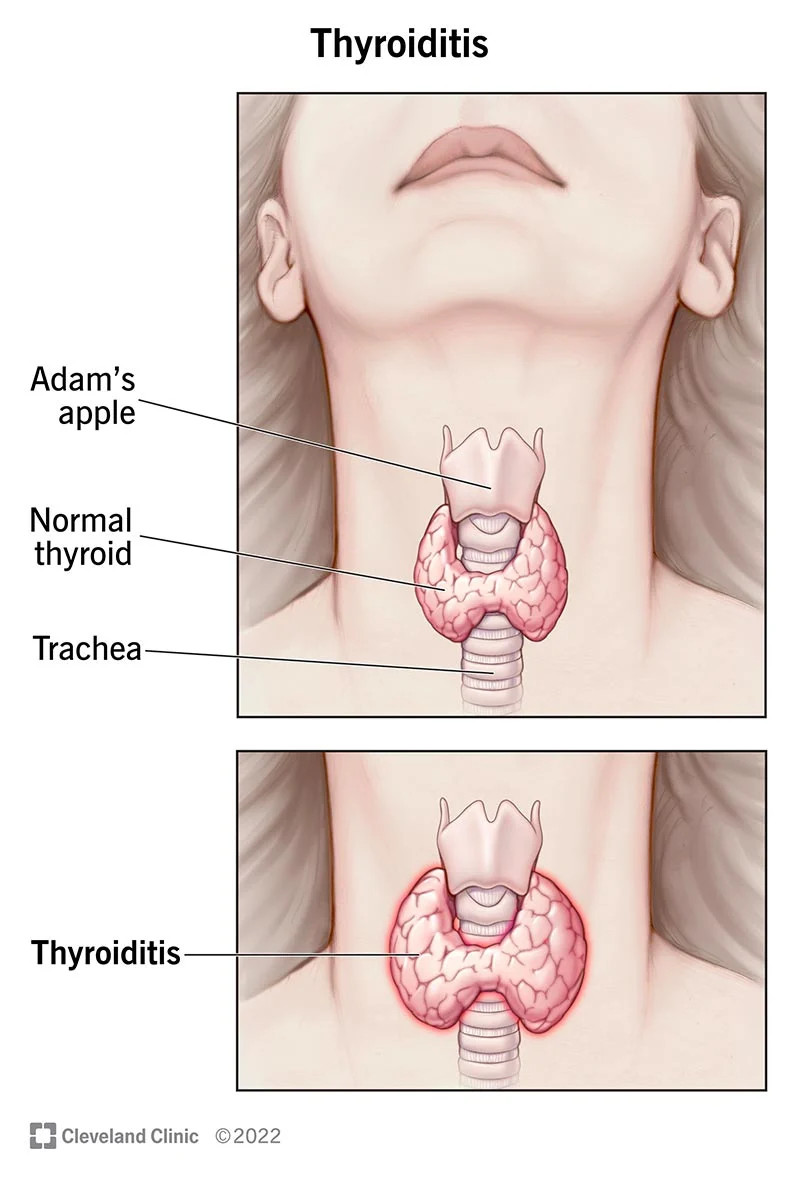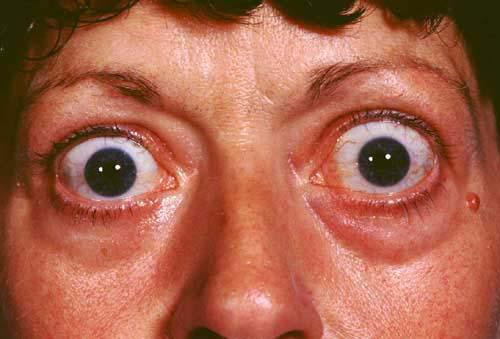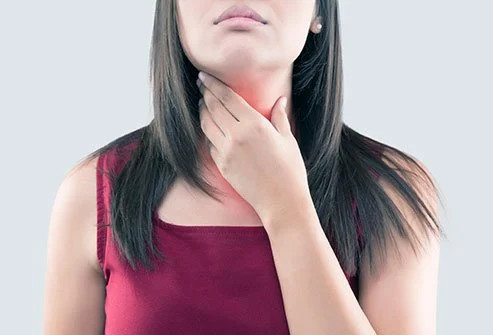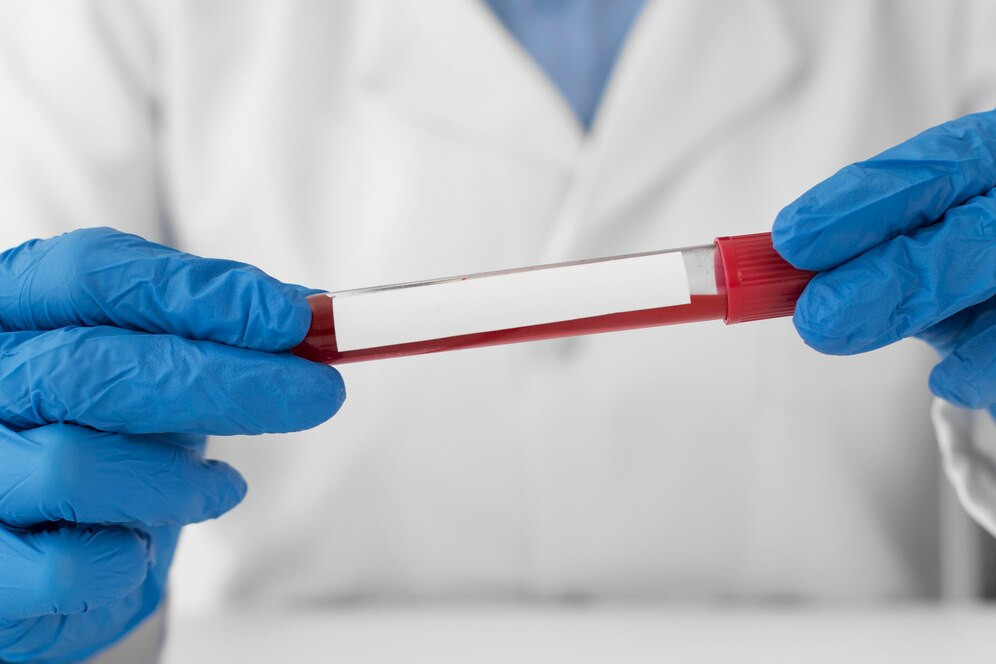Definition
Thyroiditis refers to the inflammation of the thyroid gland, which can result in either excessive or insufficient thyroid hormone production, leading to hyperthyroidism or hypothyroidism, respectively.
Most forms of thyroiditis progress through three phases:
- Thyrotoxic phase: During this stage, the thyroid becomes inflamed and releases an excess of thyroid hormone, causing temporary thyrotoxicosis.
- Hypothyroid phase: After several weeks or months of elevated hormone release, the thyroid depletes its reserves, resulting in hypothyroidism. In conditions such as Hashimoto's thyroiditis and radiation-induced thyroiditis, this phase may become permanent.
- Euthyroid phase: In this phase, thyroid hormone levels return to normal. This can occur temporarily following the thyrotoxic phase, before transitioning into the hypothyroid phase, or it may represent the final stage when the thyroid recovers from inflammation and resumes normal hormone regulation.
Causes
Different types of thyroiditis have distinct causes:
- Hashimoto's thyroiditis: An autoimmune disorder, also known as chronic lymphocytic thyroiditis, in which antithyroid antibodies attack the gland. It is the most common cause of both thyroiditis and hypothyroidism.
- Silent or painless thyroiditis: An autoimmune condition triggered by antithyroid antibodies.
- Postpartum thyroiditis: An autoimmune disorder caused by antithyroid antibodies that can develop within a year after childbirth, although it is relatively rare.
- Radiation-induced thyroiditis: This occurs following radiation therapy for certain cancers or from radioactive iodine treatment for hyperthyroidism.
- Subacute thyroiditis or de Quervain's thyroiditis: This painful condition is believed to be viral in origin and often follows an upper respiratory infection.
- Acute infectious thyroiditis: A rare form caused by bacterial or other infectious agents.
- Drug-induced thyroiditis: Triggered by medications such as amiodarone, interferon, lithium, and cytokines, but it only affects a small number of individuals who take these drugs.
- Riedel's thyroiditis: A rare condition characterized by long-term inflammation and fibrosis (thickening or scarring) of the thyroid gland.
Risk Factor
Although thyroiditis can affect anyone, it is more prevalent in women, particularly older women.
Hashimoto's thyroiditis is 4 to 10 times more common in women than men and typically occurs between the ages of 30 and 50.
Silent or painless thyroiditis is also more common in women and is the second leading cause of thyroiditis after Hashimoto’s.
Symptoms
The symptoms of thyroiditis vary depending on its type and stage. Most forms of thyroiditis initially present with symptoms of thyrotoxicosis, followed by symptoms of hypothyroidism.
Subacute and acute infectious thyroiditis are often associated with pain in the thyroid region. In some cases, individuals with thyroiditis may develop an enlarged thyroid gland, known as a goiter.
The thyrotoxic phase of thyroiditis is usually brief, lasting from one to three months. During this phase, rapid destruction of thyroid cells and leakage of thyroid hormone can result in hyperthyroid symptoms, including:
- Rapid heart rate
- Increased appetite
- Unexplained weight loss
- Anxiety
- Irritability
- Difficulty sleeping
- Increased sweating and heat sensitivity
- Tremors
The hypothyroid phase, which may last longer or become permanent, occurs when thyroid hormone levels are depleted. Symptoms of hypothyroidism include:
- Fatigue
- Unexplained weight gain
- Constipation
- Depression
- Dry skin
- Increased sensitivity to cold
- Muscle weakness
- Difficulty concentrating or focusing
Diagnosis
Your doctor will conduct a physical examination, including an evaluation of your thyroid gland, and inquire about your symptoms and medical history.
If thyroiditis is suspected, your doctor may recommend a combination of the following tests:
- Thyroid function test: This blood test measures thyroid-related hormone levels in the body, such as thyroid-stimulating hormone (TSH), T3 (triiodothyronine), and T4 (thyroxine). TSH is produced by the pituitary gland and stimulates the thyroid to produce T3 and T4, collectively known as thyroid hormones.
- Thyroid ultrasound: Doctors often utilize ultrasound to examine the structure of the thyroid gland. This imaging can detect tumors, changes in blood flow, and alterations in thyroid density.
- Thyroid antibody test: This blood test checks for thyroid antibodies, including antithyroid antibodies or thyroid receptor-stimulating antibodies (TRAb). These antibodies suggest that thyroiditis is caused by an autoimmune disorder.
- Erythrocyte sedimentation rate (ESR): A blood test that helps detect inflammation in the body. Elevated ESR is common in subacute thyroiditis.
- C-reactive protein (CRP): This test measures the level of CRP in the blood, which rises during inflammation. It is often elevated in cases of acute infectious thyroiditis.
- Radioactive iodine uptake (RAIU) test: This test measures how much radioactive iodine is absorbed by the thyroid after ingestion. The uptake is usually low during the thyrotoxic phase of thyroiditis.
Management
The management of thyroiditis varies depending on the type and symptoms.
Thyrotoxicosis Therapy
If you are in the thyrotoxic phase, your doctor may prescribe a beta blocker to lower your heart rate and reduce tremors. As your symptoms improve, the medication will be tapered, as thyrotoxicosis is typically a temporary phase.
Hypothyroidism Therapy
For Hashimoto's thyroiditis, a thyroid hormone replacement medication, such as levothyroxine, will be prescribed. This treatment is typically lifelong, as Hashimoto's hypothyroidism is usually permanent. In cases of subacute, silent, or postpartum thyroiditis with hypothyroid symptoms, thyroid hormone replacement is also prescribed, often for 6 to 12 months. Afterward, the medication may be gradually discontinued to determine whether hypothyroidism persists. If the condition is mild and symptoms are few, medication may not be necessary.
Other Treatments
Acute infectious thyroiditis requires immediate treatment of the underlying infection, often with antibiotics. If an abscess forms in the thyroid, fluid and pus may be drained using fine needle aspiration. Drug-induced thyroiditis tends to last as long as the offending medication is taken. In such cases, the doctor may adjust the medication or prescribe levothyroxine while the patient continues the medication that caused the thyroiditis. Pain associated with acute infectious or subacute thyroiditis can generally be managed with non-steroidal anti-inflammatory drugs (NSAIDs) such as aspirin or ibuprofen. Severe pain may require steroid therapy. Riedel's thyroiditis typically requires surgical intervention.
Complications
Thyroiditis is generally not life-threatening. However, untreated or improperly managed long-term hyperthyroidism can lead to a life-threatening condition called thyroid storm.
Symptoms of thyroid storm include:
- High fever, with body temperatures reaching 40 to 41°C
- Rapid heart rate, often exceeding 140 beats per minute
- Restlessness, irritability, or anxiety
- Decreased consciousness and confusion
Prevention
Most cases of thyroiditis cannot be prevented.
If you are undergoing treatment that involves radioactive iodine or radiation therapy, discuss the potential risk of thyroiditis with your doctor.
If you are on medications that may lead to thyroiditis, talk to your doctor to evaluate your risk and whether discontinuation is a viable option.
When to See a Doctor?
If you experience symptoms of thyroiditis, it’s important to consult a doctor for proper diagnosis and treatment.
In the case of symptoms of thyroid storm, which is a medical emergency, call 911 or go to the nearest hospital immediately.
Looking for more information about other diseases? Click here!
- dr. Monica Salim
Thyroiditis: Types, causes, symptoms, diagnosis & treatment (2022) Cleveland Clinic. Available at: https://my.clevelandclinic.org/health/diseases/15455-thyroiditis (Accessed: February 20, 2023).
Thyroiditis (2022) NHS choices. NHS. Available at: https://www.nhs.uk/conditions/thyroiditis/ (Accessed: February 20, 2023).
Thyroiditis (no date) American Thyroid Association. Available at: https://www.thyroid.org/thyroiditis/ (Accessed: February 20, 2023).











